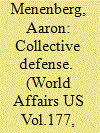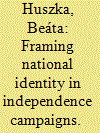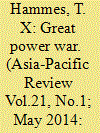| Srl | Item |
| 1 |
ID:
123079


|
|
|
|
|
| Publication |
2012.
|
| Summary/Abstract |
THEDA SKOCPOL and LAWRENCE R. JACOBS assess the policy accomplishments and shortfalls of President Barack Obama since 2009. They highlight the obstacles with which Obama and his political allies have had to contend and challenge commentators who claim that Obama has accomplished little. They explain why conservative and Republican opposition to Obama's presidency has been fierce and unremitting.
|
|
|
|
|
|
|
|
|
|
|
|
|
|
|
|
| 2 |
ID:
134099


|
|
|
|
|
| Publication |
2014.
|
| Summary/Abstract |
Since the end of World War II, Japan has relied on the United States for its security, an arrangement enshrined in the US-written Japanese Constitution of 1947 and augmented by subsequent agreements between the two allies. Article IX of the Constitution prohibits Japan from taking part in any conflict or building a traditional military. (When President George H.?W. Bush organized the "coalition of the willing" against Iraq in 1991, Japan was able only to offer financial assistance because of this stipulation.) But with the rise of China and its assertion of sovereignty in regions Japan claims as its own, Tokyo has begun to expand its military capability. Some government officials wonder how these moves will affect relations with the United States, Japan's protector for the last half-century.
|
|
|
|
|
|
|
|
|
|
|
|
|
|
|
|
| 3 |
ID:
131987


|
|
|
|
|
| Publication |
2014.
|
| Summary/Abstract |
During secessionist mobilization in a multiethnic environment, the use of a discourse that excludes minorities can create internal enemies; meanwhile, co-opting minorities through inclusive framing can turn them into allies. From the standpoint of what sort of identity constitutes the basis of a nationalist movement, my fundamental argument is that the most crucial factor is whether there is a widespread perception of internal threat associated with the presence of a local minority. The chance of such perceptions of a threat emerging among the majority increases if the minority is politically linked to the center or a neighbor that is hostile to the movement. Yet, this explanatory model can show only a tendency depending on the structural setting; it cannot explain the timing and nature of identity shifts. I demonstrate that it is possible to include previously excluded minorities into the national collective through a reframing of national identity, and that the explanation of ethnic exclusion cannot be reduced to a simple ethnic security dilemma.
|
|
|
|
|
|
|
|
|
|
|
|
|
|
|
|
| 4 |
ID:
131845


|
|
|
|
|
| Publication |
2014.
|
| Summary/Abstract |
Proponents of a wide range of power transition theories suggest that conflict between the United States and China is inevitable. History indicates that is not true and conflict can be deterred. A key element to that deterrence is an effective Alliance strategy. While the Obama Administration has outlined an effective deterrent national strategy, it has not provided any military strategy. Some have proposed Air Sea Battle can be that strategy. For a variety of reasons, ASB will not work. This article proposes the Alliance adopt Offshore Control as a military strategy to deter China and assure allies and friends in the region. It is based on the concept of defending the first island chain, denying China use of the seas inside the first island chain and dominating the seas outside it. Its deterrent power is enhanced because Offshore Control is affordable, politically feasible, and can be executed today.
|
|
|
|
|
|
|
|
|
|
|
|
|
|
|
|